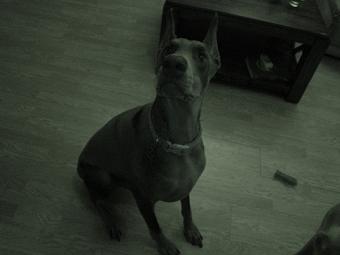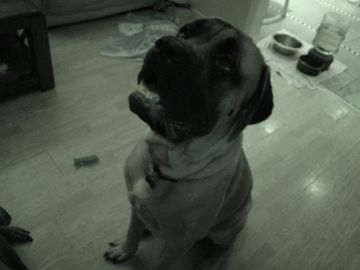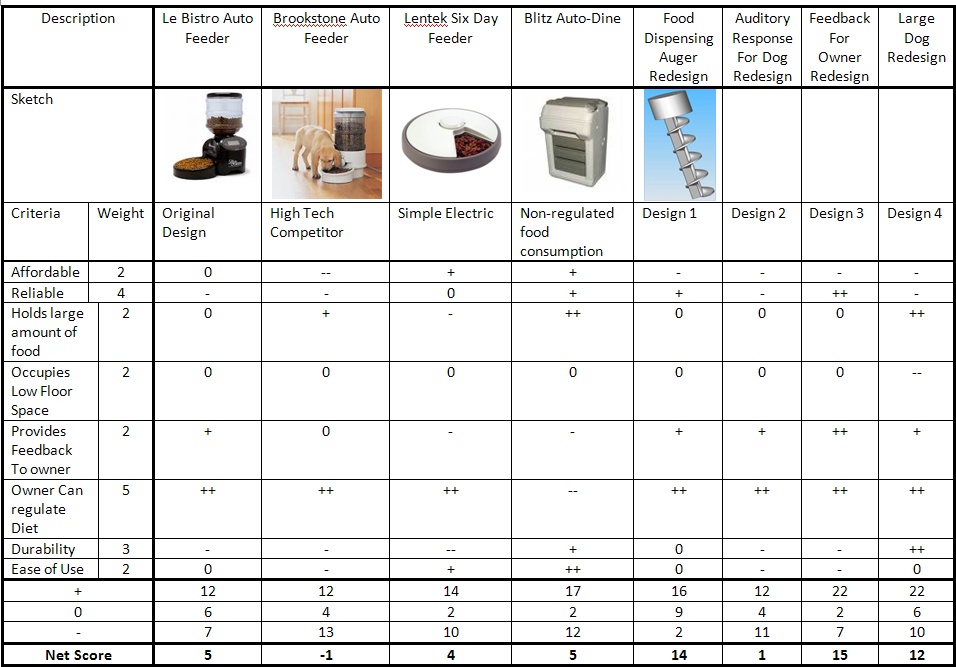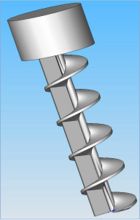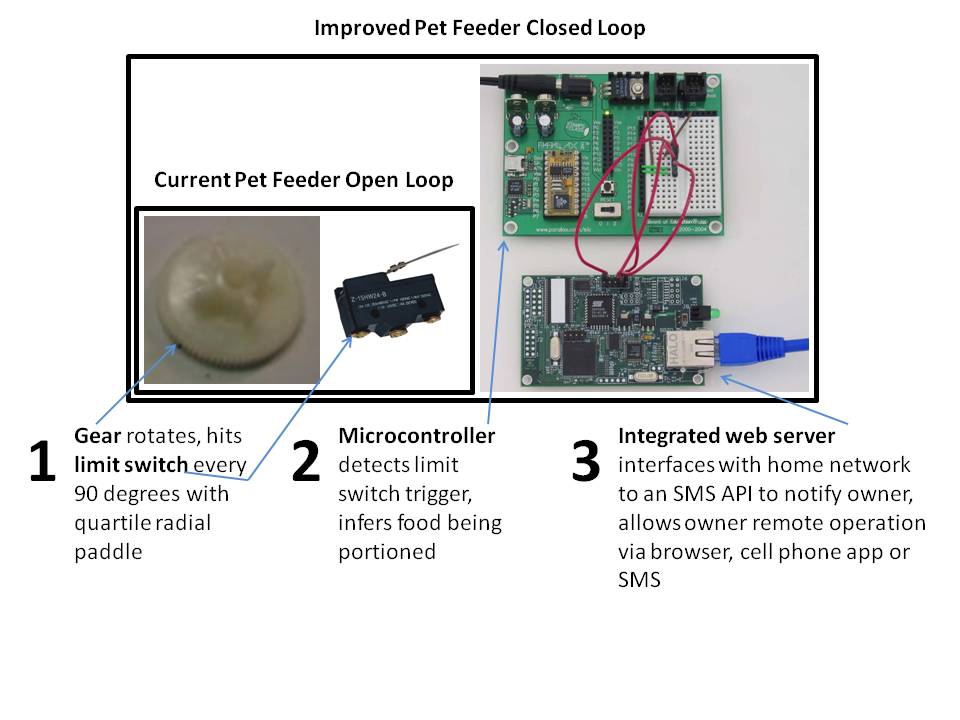Automatic pet feeder redesign
From DDL Wiki
(→Owner Feedback Improvment: Remote operation and notification) |
|||
| Line 166: | Line 166: | ||
To maintain the feeder's ability to control portions, there will be compartments within the helical section of the auger. These will allow food within the auger to be kept in known portions, and a limit switch will be used to notify the motor when to run and stop. To trip the limit switch we will use a gear design similar to the current gear on the motor, with protrusions that contact the limit switch. | To maintain the feeder's ability to control portions, there will be compartments within the helical section of the auger. These will allow food within the auger to be kept in known portions, and a limit switch will be used to notify the motor when to run and stop. To trip the limit switch we will use a gear design similar to the current gear on the motor, with protrusions that contact the limit switch. | ||
| + | |||
==Owner Feedback Improvment: Remote operation and notification== | ==Owner Feedback Improvment: Remote operation and notification== | ||
Revision as of 19:53, 6 October 2009
Contents |
Executive Summary
Jason will write this when everything is done.
Market Research
Insert a summary of what follows below here, introduce us to what is going on and tell us what we are going to find and what to look at below.
Brookstone Auto Feeder
Special Features<ref name="Brookstone_Product_Details">http://www.brookstone.com/Programmable-Automatic-Dog-Feeders.html?bkeid=compare|mercent|googlebase|search&mr:trackingCode=0DA45775-E985-DE11-9973-0019B9C2BEFD&mr:referralID=NA</ref>
- Price: $129.95
- 20lb capacity for large, but available in different size
- Programmable digital timer, allows for up to 8 meals per day
- AC adapter included, power cord has protective sheathing to prevent pets from chewing
- Battery backup
Customer Reviews
- 3.9/5 Stars on Brookstone<ref name="Lentek_Rating">http://www.brookstone.com/Programmable-Automatic-Dog-Feeders.html?bkeid=compare|mercent|googlebase|search&mr:trackingCode=0DA45775-E985-DE11-9973-0019B9C2BEFD&mr:referralID=NA</ref>
- Attractive design
- Able to feed 7 cats
- Difficult to program
- Pet can get extra food by sticking their paw up the food shoot
- Food amount unpredictable
- Works better with large amounts of food
Lentek Automatic Six Day Feeder
Special Features<ref name="Lentek_Product_Details">http://www.walmart.com/catalog/product.do?product_id=5969455&sourceid=1500000000000003260550&ci_src=14110944&ci_sku=5969455#ProductDetail</ref>
- Price: $39.84
- 6 separate, 2/3 cup food trays
- Can dispense wet food
- Serves up to six meals over six days
- Timer set on 6,12, or 24 hour intervals
Customer Reviews
- 3.5/5 Stars on Amazon<ref name="Lentek_Rating">http://www.amazon.com/Lentek-6-Day-Automatic-Pet-Dish/product-reviews/B00006JHRE/ref=dp_top_cm_cr_acr_txt?ie=UTF8&showViewpoints=1</ref>
- Loud motor
- Battery doesn't last very long
- Easily broken
- Trays are small if trying to feed a large dog
- Refill food often
Blitz® Auto-Dine 25 Dog Feeder
Special Features<ref name="Blitz_Product_Details">http://www.acehardware.com/product/index.jsp?productId=1288930&CAWELAID=112344059</ref>
- Price: $34.99
- 25lb. capacity
- Can be permanently mounted
- Water proof lid, can be used indoor or out
Customer Reviews
- 4.5/5 Stars on Amazon<ref name="Blitz_Rating">http://www.amazon.com/Bergan-Aut-O-Dine-25-Colors-Vary/product-reviews/B000BQSKS2/ref=cm_cr_dp_all_summary?ie=UTF8&showViewpoints=1&sortBy=bySubmissionDateDescending</ref>
- Dogs regulate own food consumption
- Dogs have to push door open to get food
User Study
Two human users (Allison Klee and Justin Lervin) and two dogs (Sly and Rigby) were studied using the original LeBistro dog feeder.
The Dogs:
Filling the Hopper
Filling the feeder was a challenge. Both dogs jumped and barked at the owner as they filling the PetMate feeding hopper. Sly actually got his head into the hopper and started eating right out of the tank before the owner could get the lid on. The dogs were noisy and pushy and got canine saliva on the owner and the automatic feeder. The food was difficult to pour into the small hopper and the feeder itself slid around the tiled floor while the food was pouring in.
Sly
The Before: Sly ate out of a metal bowl on the floor next to a PetMate automatic water bowl. His shoulder height allowed him to reach his food bowl and water dish with what appeared to be only slight discomfort and both receptacles were large to accommodate his head and muzzle. The food dish was filled by hand once a day with two scoops of dry dog food.
PetMate Trials:
Sly was very cautious around the new feeder. The noise of the feeder dropping food scared him a little and he would not go near the feeder until Allison, his owner, went to the feeder and talked encouragingly to coax him to the food. Once he learned that the feeder was not an attacker Sly calmed down and ate right out of the bowl as soon as the food was dropped. After a few rotations of the feeder, it was programmed to drop food at a randomly picked time in the next hour, which ended up being 20 minutes. Sly was left alone and not encouraged to go to the feeder or stay in the room. As soon as the food dropped into the bowl Sly was eating it again, but he would dart away if the feeder made any noise.
Rigby
The Before:
Rigby had a custom-made setup from Justin consisting of a wooden table with metal bowls sitting in cut-out holes [see photo]. The food and water dishes were the same type and the table allowed Rigby to comfortably reach his food without straining his head or shoulders. Rigby's shoulder height makes it impossible for him to reach the ground without bending his front legs and crouching painfully. Rigby was fed six scoops of food, once a day.
PetMate Trials:
Rigby would absolutely not go near the feeder unless his owner was next to it and it was not running. If the feeder dropped food, Rigby would run into the next room. It took about an hour for Rigby to start eating out of the food dish on the feeder and even then any sudden movement would send him running. He once got so frightened that he knocked over the entire feeder and then ran sheepishly away. This may all be caused by the fact that he is a young dog [only a year old] and very large. His head did not fit well into the feeding dish. The tiny portions that the feeder provides mean that it has to turn for almost a full minute to give Rigby enough food for a meal. Rigby also pushes the feeder around the kitchen floor because he is much too strong and large to eat daintily out of a small feeder.
User Interview
The human users had a few needs they requested be met
- hold enough food both dogs for three days with no need to refill the hopper
- be heavy enough to not move or have it be attached to something
- make the appliance sturdier so the dogs won't bend the plastic/break it if they knock it over
User Scenario
A pet owner, named Laurren Watch, owns two dogs and lives in a large two story house. She has one roommate who enjoys the dogs' company, however this roommate does not have ownership over the dogs, and therefore he/she rarely takes care of the dogs. Laurren owns two battery powered automatic pet feeders, one for each dog, because she leaves town for business trips but wants to keep her dogs on strict diets. One of the dogs is a large German Shepherd, and the other dog is a small Chihuahua.
The pet feeder is programmed to dispense meals of different sizes, three meals per day.
Laurren leaves for one week on a business trip, and she sets the meal sizes and meal times. This is due to the fact that her roommate does not know how much to feed the dog, or at what times. Laurren believes that her roommate would forget to feed the dog or would leave the house to complete daily tasks, without filling the bowl.
This is a plausible situation based on our research with dog owners. Potential problems that could occur include:
- Laurren is worried that the feeder malfunctions, so she asks her roommate to check the feeder. The roommate could be confused by the three button interface, as well as by the manual feed function (Hold one of the buttons down for several seconds. The button that you need to hold is not labeled as the "manual feed" button).
Solution: change the interface.
- If Laurren asks her roommate to check the feeder, he/she would still not know whether food came out. The bowl could be empty since the dog ate all of it, or the feeder may have malfunctioned, and no food came out.
Solution: Add a feedback system to notify the owner of the pets.
- If the roommate is gone or busy, the large dog could knock one or both of the pet feeders over. User studies have shown that large dogs are willing to push the feeder. In this case the lid could become loose and food would be spread out on the ground. According to market research, many feeders hold at least several days worth of food. This is a profuse amount of food to provide to a pet, given that the pet knocks the hopper, and lid, off and food spills out.
Solution: Prevent feeder from falling over, or being top heavy.
- The feeder has been shown to provide inconsistent meal sizes during user studies. Since Laurren is concerned about the diet of her dogs, providing too little or too much food would be undesirable.
Solution: Add a feedback system to notify the owner of the pets.
- In this scenario Laurren may become worried and call the roommate, to have him/her check the dogs and feeders. Given the roommate's ignorance towards the dogs' diets, Laurren would look for an alternative to contacting the roommate. This is how the closed feedback system would provide an improvement.
Solution: A text message could be sent to Laurren, wherever she is, notifying her of meals recently provided. To close the system for the pet, the feeder could also provide audio recordings of the owner, so that the dog may recognize the owner's voice during feeding time.
Design and Competitor Comparison
Pugh Chart
Design Recommendation
This pugh Chart shows that our concepts for redesign directly address our top stakeholder needs and gives them a much higher score. The Net Score from the Pugh Chart identifies Design 3 as our design. This design is the best because it addresses the important need of reliability. If the owner is alerted every time their pet has been fed, it provides a peace of mind for the owner that none of the other designs can match. In the feedback for owner design issues are going to be affordability and ease of use, if these issues can be properly addressed it will be an effective design. The next best score comes from the Auger Redesign, which offers significant improvements in reliability because it is improving the most unreliable part, the feeding mechanism. We believe that an effective auger design will increase the meal size consistency.
Product Improvements
Summarize what we hope to do here with improvements, what areas are we tackling, and why? Reference our FMEA to motivate the disucssion of this document below. We can include the doc we used to talk about what was wrong as an appendix. More specifically, what is the opportunity? It could be a problem (FMEA) or a novel approach (improvement). And what is the solution? Motivate the opportunity so that we WANT to see the solution.
Feeding Mechanism Redesign
The original rotating fin design was susceptible to food becoming stuck before reaching the bowl at the bottom. This design would be replaced by one relying on a horizontally oriented auger. The auger is similar in design to a screw, with threads that follow a helical shape, and the helical axis is the axis along the screw's length. The auger differs in that, compared to the properties of a screw<ref name="screw properties">http://www.buyblueprint.com/images/articles/48/122.jpg</ref>, the auger has a larger thread angle and pitch.
Rotation about the axis allows for translation of material along the axis <ref name="archimedes pump">http://commons.wikimedia.org/wiki/Category:Archimedes'_screws</ref>. There would be a chamber that the auger is held within, and the food would enter from a hole in the chamber, located above the auger. The food would only have access to the auger on one end, and as the auger rotates, food would be transferred to the opposite end, without interference from the other pellets of food. Once the food reaches the other end, there will be an opening at the bottom to drop the food into the bowl.
To maintain the feeder's ability to control portions, there will be compartments within the helical section of the auger. These will allow food within the auger to be kept in known portions, and a limit switch will be used to notify the motor when to run and stop. To trip the limit switch we will use a gear design similar to the current gear on the motor, with protrusions that contact the limit switch.
Owner Feedback Improvment: Remote operation and notification
To assume the status quo on the domain of pet feeders as a sufficient solution to the problem of feeding a pet when the owner is not present is something this design group does not do. If one considers the existential problem, and forgets about the specific implementation, product improvements organically arise from this exercise. Consider the fact that for a machine that operates remotely, it must be programmed locally. A machine that operates remotely should be accessible remotely since it is the remote operation that is the characteristic nature of the machine. Consider the fact that for such a delicate matter as ensuring that a pet is fed correctly, there is no peace-of-mind that the machine is operating. The owner is left to analyze the state of the animal as a feedback process for gauging the machines operation. While this may be sufficient in the non extreme case of daily departure, it is hardly optimal for the extended duration (1 week +) which this machine is ideally suited to do.
This discussion motivates two improvements in the area of feedback and interface.
1) Remote operation of the machine to modify feeding cycles and manually override prescribed feeding regimen
2) Notification system to inform owner that the pet was fed; (quantity, time, duration)
A diagram below shows how an embedded system solves both of these problems.
Auditory Pet Feedback Redesign
The original design of the pet feeder simply dispensed the food at the serving time. If a pet is not very observant or if the owner is trying to train it this could cause a problem. So this redesign involved adding a voice recording that not only alerts the pet that the food is being dispensed but also can tell them to sit and wait until the food is finished being served to eat. This allows a working individual to not interrupt the training of the pet just because they are not present. This could also comfort the pet when the owner is away for long periods of time.
Option 4?
Action Plan
Insert Gantt chart here.
task list for report 2
3 ideas: feedback for dog, auditory feedback (james) feedback for owner, remote operation (jason) feeding mechanism redesign, auger (gumball machine, grain, etc...) (gary)
Provide a brief executive summary that describes your key findings and recommendations. • Provide a description of your market research and observations. Include pictures to communicate key observations where possible. Summarize top stakeholder product needs in a list. Jason
• Provide sketches and descriptions of your top three to five design concepts, describing what opportunities have been identified and how they will be addressed. Gary, Jason, and James
• Identify relevant competitor products from your patent searches, commercial searches, web searches, and expert interviews. Compare pros and cons of each of your concepts on a standard Pugh chart against your top stakeholder needs, and benchmark against the most relevant competitors. If your concepts are better on some attributes and worse on others, identify any market segments likely to value the tradeoffs you can offer. James
• Provide a Gantt chart to map out the team plan for design and prototyping through the remainder of the semester. Please be detailed to your particular project and individual member contributions. Lauren
• Identify team member roles during this phase and summarize your process. Submit
individual peer evaluations to Prof. Michalek.
EVERYONE
• Summarize your findings and recommendations. In particular, identify which concept you recommend pursuing for the remainder of the semester. EVERYONE
Provide a hypothetical user scenario representative of your target market from your research findings to motivate your top solution concept. Gary
• Include your list of at least 100 brainstorming ideas in an appendix. EVERYONE
• Of course, please include an executive summary, citations of references, and formatting expected of any professional report. Be sure to clearly highlight your major findings and recommendations in each section and overall. Identify any critical places where more information is needed.
Be sure to justify all assertions and recommendations using your research and analysis. EVERYONE
Appendix A: 100 Brainstorming Ideas
1) 2) 3) etc...
References
<references/>

